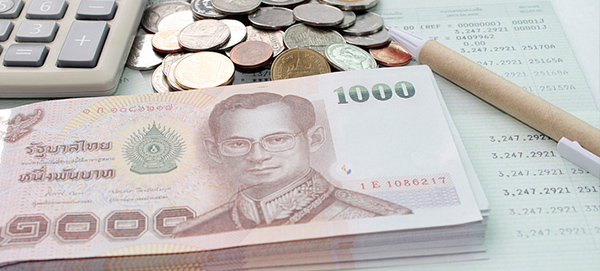Tips for Thai Expats: Save Tax by Contributing to RMFs and SSFs
By Peggy Creveling, CFA, and Chad Creveling, CFA
As the end of the year approaches, expats working in Thailand may wish to consider sheltering some of their income from Thai tax by contributing to Thailand’s Retirement Mutual Funds (RMFs) or the new Super Saver Funds (SSFs). With a bit of planning, you may be able to save up to THB 175,000 (or about USD 5,700) this year in Thai taxes by contributing to these types of tax-advantaged funds.
Note: The previously available Long-Term Equity Fund (LTF) program was discontinued in 2019, so Thai taxpayers can no longer make tax-deductible contributions to LTFs. If you own an LTF from past year contributions, you can still withdraw the funds free of Thai tax after maintaining the LTF for five years.
Retirement Mutual Funds and Super Saver Funds: The Basics
RMFs provide current-year Thai tax deductions on contributions, and earnings grow free of Thai tax. Subject to meeting RMF fund requirements, funds can also be withdrawn tax-free.
The new SSF program began in 2020 and is intended to replace the previous LTF program. SSFs are unlike LTFs in that SSFs have a lower contribution cap, a longer holding period, and a different investment mandate.
There are a number of different RMFs and SSFs managed by the various Thai asset management companies and distributed either directly or through affiliated bank branch networks.
How You Save on Thai Tax
For RMFs: Individuals can deduct contributions of up to 30% of their personal income (including salary, bonus, fees, commissions, severance pay, or investment income) or THB 500,000 per year (whichever is lower) from current Thai taxable income.
For SSFs: Individuals can deduct contributions of up to 30% of annual compensation or THB 200,000 (whichever is lower) from current-year taxable income.
For high-income earners, combined contributions to RMFs, SSFs, Thai Provident Funds (TPFs), or other tax-advantaged plans together in 2020 are capped at a total of THB 500,000 (about USD 16,300). This would potentially lower Thai taxes by THB 175,000 (or roughly USD 5,700).
What You Need to Know About RMFs and SSFs
Retirement Mutual Funds:
- You get a current-year Thai tax deduction on contributions.
- Depending on the fund’s policy, the fund manager may invest in equity funds (Thai as well as international), debt instruments, or mixed funds.
- Returns grow free of Thai tax.
- The maximum annual contribution has been increased to the lesser of 30% (increased in 2020 from 15% previously) of total annual compensation, but capped at THB 500,000. Total annual deductible contributions to tax-advantaged plans (including RMFs, TPFs, and SSFs) are also limited to THB 500,000.
- Contributions need to be recorded before the end of the calendar year.
- Funds can be withdrawn free of Thai tax after age 55 (and if held for five years or more).
- To qualify for Thai tax benefits, you must contribute at least every other year for a minimum of five years. The minimum contribution is 3% of taxable compensation or THB 5,000, whichever is lower.
- If you fail to meet the required minimum contribution schedule or withdraw funds prior to reaching age 55, or have not met the five-year holding requirement, you will have to pay back any tax deduction you received along with penalty fees. In addition, any capital gains will be subject to a 10% tax.
- To avoid Thai tax on Thai Provident Fund distributions, TPF participants facing employment termination can request that their TPF account balances be transferred or rolled to an RMF until they meet requirements to withdraw their funds free of Thai tax. This could save a substantial amount in Thai tax, if the TPF balance is significant.
Super Saver Funds:
- You get a current-year Thai tax deduction on contributions.
- Whereas the previous LTF program invested primarily in Thailand-listed stocks, SSFs may invest in a broader range of investments.
- At a minimum, they must invest 65% of funds in Thai-listed securities such as stocks, exchange traded funds (ETFs), property funds, real estate investment trusts (REITs), and infrastructure funds.
- SSFs may also invest in debt instruments, non-investment-grade debt securities, unlisted equities, and derivatives instruments.
- Returns grow free of Thai tax.
- The maximum annual contribution is the lesser of 30% of total annual compensation or THB 200,000.
- There is no need to make ongoing contributions to maintain tax benefits.
- Contributions and earnings can be withdrawn free of Thai tax after 10 years.
- If you withdraw before the 10-year holding period, any tax deductions you received will need to be paid back along with penalty fees. In addition, any capital gains will be subject to a 10% tax.
- Contributions must be recorded by the end of the calendar year.
Note that the total contributions to RMFs, SSFs, TPFs, or other tax-advantaged plans together in 2020 are capped at THB 500,000. The rules regarding RMF and SSF contributions can and do change, so make sure you check the current status before making any contributions.
Who Can Benefit from RMFs and SSFs?
Aside from Thai citizens, many foreigners with a long-term commitment to Thailand through work, marriage, or lifestyle can benefit from contributing to RMFs and SSFs. Those on short-term expat assignments in Thailand will have to carefully weigh the potential benefits against the various rules and regulations required to maintain the tax-exempt status of each fund.
Special Considerations for Americans
There are additional considerations for Americans who are taxed by the IRS on worldwide earnings and compensation. The tax-advantaged status of RMFs and SSFs is not recognized by the IRS. In addition, both RMFs and SSFs are likely to be considered Passive Foreign Investment Companies (PFICs) by the IRS and therefore subject to special tax rules and filing requirements.
Though the IRS does not recognize these programs as U.S. tax-advantaged vehicles and classifies them as PFICs, contributing to them may still make sense for Americans. This is especially the case for whose compensation does not exceed the Foreign Earned Income Exclusion (FEIE). In this case, all compensation earned in Thailand would be shielded from tax by the IRS due to the FEIE. Contributions would then save Thai tax. Even though earnings on the contributions would have to be reported annually under PFIC rules, you would still be ahead since you’re investing with funds you would have otherwise paid to the Thai Revenue Department.
If you earn in excess of the Foreign Earned Income Exclusion, contributions could still make sense, but the benefit diminishes as you enter the higher tax brackets. Compensation in excess of the FEIE will effectively be taxed at the higher of the U.S. or Thai rate. You’ll need to do the math and compare your options to see if making contributions could make sense.
Don’t Ignore the Potential Benefits of RMFs and SSFs
For many Thailand-based expats, the Thai tax benefits of contributing to these tax-advantaged programs can be a great holiday gift to yourself. Do yourself a favor and check them out—just make sure you understand the rules and regulations, and for Americans, the potential tax consequences.
Additional Resources:
The New and Improved Thai Provident Fund
American Expats: PFICs—Don’t Get Caught Out by U.S. Tax Rules on Foreign Investments
About Creveling & Creveling Private Wealth Advisory
Creveling & Creveling is a private wealth advisory firm specializing in helping expatriates living in Thailand and throughout Southeast Asia build and preserve their wealth. The firm is a Registered Investment Adviser with the U.S. SEC and is licensed and regulated by the Thai SEC. Through a unique, integrated consulting approach, Creveling & Creveling is dedicated to helping clients cut through the financial intricacies of expat life, make better decisions with their money, and take the steps necessary to provide a more secure future.
Copyright © 2020 Creveling & Creveling Private Wealth Advisory, All rights reserved. The articles and writings are not recommendations or solicitations, and guest articles express the opinion of the author; which may or may not reflect the views of Creveling & Creveling.


